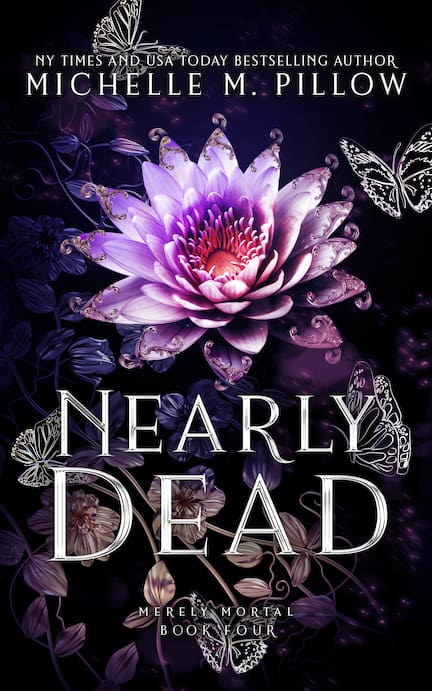Summary
NYT Bestselling Author Michelle M. Pillow discusses popular romance and fantasy tropes in her Bored Panda interview, exploring why readers love morally gray heroes and fated mates—while also reminding us that real-life love should always be safe and healthy.
I’m excited to share that I was recently featured in a Bored Panda article discussing popular tropes in literature that, while enticing on the page, might be unsettling in real life. In the interview, I delve into the allure of fated mates, the fascination with morally gray antiheroes, and the balance between creating complex characters without glorifying their flaws. It’s an interesting exploration of how fiction allows us to safely navigate intense themes and emotions.
Explore the Topic: My full interview answers are below!
You can read the article “What’s Something That’s Hot In Books But Repulsive In Real Life?” (40 Answers) Interview With Expert here: https://www.boredpanda.com/hot-in-books-repulsive-real-life/
While fiction gives us a safe space to explore dark and complex relationships, real life is a completely different story. No one should ever feel trapped in a toxic or abusive situation. If you’re in a relationship that makes you feel unsafe, unheard, or unworthy, please know that you deserve better. Love should never come at the cost of your well-being. If you need support, reach out to trusted friends, family, or professional resources—help is out there, and you are not alone. You are worthy of love, respect, and a future filled with happiness. 💜
Full Bored Panda Interview
A special thank you to Austeja Zokaite for having me!
1. What’s a trope you love writing, even though it would be disturbing/repulsive in real life?
Oh, where do I start? The fated mates trope is a favorite of mine—where two people are irresistibly drawn together by an unbreakable, supernatural bond. In fiction, it’s all-consuming, swoon-worthy, and layered with tension. But in real life? If someone showed up claiming destiny had decided we must be together, I’d be reaching for a restraining order.
This is a trope I love playing with in my books, especially in the fan-favorite relationships of my Dragon Lords series. These guys are the ultimate believers in love at first sight—they even have crystals that glow to tell them who they’re meant to be with. It’s excellent for futuristic fantasy, but can you imagine a stranger telling you a magic rock wants you to get married? The fun comes in exploring what happens when fate has a sense of humor—because nothing says romance like discovering your soulmate is a stubborn dragon-shifter royal who thinks fate means you belong to him.
And let’s not forget the morally gray antihero—so much fun to write, but in real life, red flags would be waving like it’s a parade. Fiction allows us to examine power, redemption, and emotional intensity in a way that’s thrilling and consequence-free. It gives us the space to ask, What if? while safely knowing we can close the book at any time.
2. Why do you think readers are drawn to themes like toxic romance and broken heroes, despite how disturbing they would be in real life?
For me, it’s the same reason I love watching horror movies. They’re exciting and fun. Fiction is a playground for the what if—a space to explore intense emotions, darker themes, and high-stakes drama without any real-world mess. Toxic traits in books can be thrilling because we know they’re not real. No one is actually signing up for a relationship with a brooding, dangerously possessive shifter or a ruthless vampire. Instead, we get to experience the emotional intensity and drama from a safe distance, all while rooting for that cathartic moment of redemption or realization.
My books delve deep into intricate worldbuilding that allows readers to experience the innermost thoughts of characters as they respond to a situation or place. In the Warlocks MacGregor series, for example, my centuries-old warlocks are powerful, charming, and used to getting their way… until love comes along to knock them down a few pegs. They’re arrogant, mischievous, and prone to magical hijinks, but that just makes it even more fun to watch them fall hard.
Then there are the broken heroes—damaged, complex, and fighting their own demons. They appeal to our innate love for transformation and hope. In Barely Breathing, the third and newest book in my Merely Mortal series, Tamara comes face-to-face with characters who carry emotional scars, some of whom have let their pasts define them, while others are desperately trying to claw their way toward something better. Fiction lets us explore those struggles without being trapped in them, allowing us to see ourselves reflected through the lens of a different world.
3. Do you try to make a character engaging and complex without romanticizing their flaws? If so, how?
Absolutely! The key is balance. I love writing morally gray characters, but their flaws have to matter—actions have consequences, and redemption isn’t handed out like free candy. If a character is controlling, manipulative, or destructive, those traits aren’t excused just because they’re attractive or have a tragic past. Instead, I make sure their flaws serve the story and push character growth rather than being framed as desirable.
For example, in Merely Mortal, Tamara encounters beings who operate by their own supernatural rules. Some of them have a warped sense of morality, but that doesn’t mean they get a free pass. She’s not afraid to call them out.
I avoid romanticizing flaws by exploring the character’s growth over the course of the story, so we see a flawed character evolve, whether that means learning from their mistakes or choosing a different path. In my Lords of the Var series, my shape-shifting heroes start out as arrogant warriors with deeply ingrained cultural ideas about power and dominance. They don’t believe in love at all, only control. Their heroines don’t let them off the hook, and watching them struggle and ultimately choose to be better men makes their romances all the more satisfying.
I also love using paranormal and fantasy elements to explore what it means to be human. My books often feature supernatural creatures grappling with their mortality, purpose, and emotions—giving readers an avenue to process their own experiences through a fantastical lens. Sometimes, it’s easier to see ourselves through the struggles of a dragon-shifter, a cursed warlock, or a vampire prince than it is to face those same emotions head-on in real life.
Would you like to add anything else?
Fiction lets us explore the messy, intense, and sometimes morally questionable aspects of love and power in a way real life never could—or should. It’s an escape, a thrill, and sometimes even a mirror reflecting our own emotions and desires in exaggerated, fantastical ways. I believe people need escapism for mental well-being, and stories have the power to transport and provide a path to self-discovery. Whether it’s a futuristic society, a haunted town, or a supernatural realm, stepping outside of reality for a while can be healing.
And, let’s be honest—sometimes we just want to watch the villain fall hard for the heroine and grovel spectacularly for redemption. I’ve written a few of those scenes, and let me tell you, there’s nothing quite as satisfying as watching a powerful, arrogant hero realize he’s absolutely wrecked without the woman he didn’t know he needed. If you love that kind of thing, I’ve got plenty of books waiting for you.
Michelle M. Pillow is a New York Times & USA Today bestselling author with books spanning paranormal romance, urban fantasy, and sci-fi. Known for her rich worldbuilding, dynamic characters, and a touch of humor, she believes fiction is the ultimate escape—whether it’s dragon-shifter royals, mischievous warlocks, or supernatural mysteries. When she’s not writing, she’s probably brainstorming new ideas over coffee, wrangling her cat, Bunny, or avoiding her actual office. Find her books at MichellePillow.com.


